3. Velindre Cancer Service Research
3.1 STAMPEDE
STAMPEDE (Systemic Therapy in Advancing or Metastatic Prostate Cancer: Evaluation of Drug Efficacy) is a large clinical trial that aimed to assess new treatment approaches for people affected by high‑risk prostate cancer.
Since 2005, the trial tested many different ways of treating prostate cancer, and some results are now already known. Each new or alternative treatment has been compared with the current standard approach, referred to as a "comparison". Almost 12,000 participants joined the trial, with answers becoming available throughout the trial as information on life expectancy and disease control rates were gathered and compared. All trial participants were asked whether they would like to join some of the sub-studies being run alongside the trial. Their aim to address several additional research questions such as what effect each treatment has on quality-of-life (QL), and which provides the greater value for money for the health service. Some sub‑studies focused on improving our understanding of the biology of prostate cancer.
The STAMPEDE trial has completed recruitment, the final day of patient randomisation being completed on 31st March 2023. Follow-up for the final patients will continue for a couple of years from this point. The trial will continue to assess the effects of adding different agents, both as single agents and in combinations, to the standard-of-care or substituting standard of care.
Velindre University NHS Trust recruited 452 participants to the trial.
The results of the Abiraterone acetate plus prednisolone with or without enzalutamide for patients with metastatic prostate cancer starting androgen deprivation therapy have been published in the Lancet.
The Lancet publication is available here: https://www.sciencedirect.com/science/article/pii/S1470204523001481
3.2 Research vibe at Green Man Festival 2023
Two of our research nurses, Claire Lang and Clare Boobier, heading to the Green Man Festival at Bannau Brycheiniog to promote research.
Volunteering on the Health and Care Research Wales stand they spread the word about research, explaining to the crowds that research takes place in Wales every day, everywhere.
Based at the Green Man’s Einstein Garden, a space exploring the point at which science, art, and nature meet. Families who came to the stand could paint brains to illustrate brain conditions, hook ducks to learn about Wales’s research heroes, fill in colourful tags to tell us what research meant to them – or to just sit in the giant deckchair!
“While we had the young ones occupied, we talked to the adults about what is happening in cancer research right now at Velindre and with our partners.
I told them, if you are ever asked to take part in research, say yes – it saves lives!” said Claire Lange, Senior Research Nurse Manager.
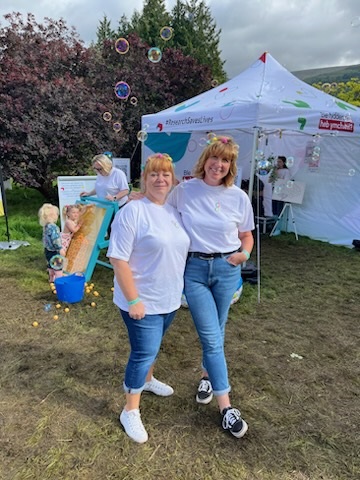 Claire and Clare hangin' out at the 2023 Green Man Festival
Claire and Clare hangin' out at the 2023 Green Man Festival
3.3 FDA approval for breast cancer drug treatment developed at Velindre
It all started more than 10 years ago with three people in a room in Cardiff, talking about ways to improve outcomes in the world’s most common type of cancer – oestrogen receptor positive breast cancer.
This led to the FAKTION clinical trial [https://velindre.nhs.wales/news/latest-news/new-phase-of-breast-cancer-treatment-trial-provides-fresh-hope-for-patients-with-incurable-disease/], investigating whether we could safely combine standard hormone therapy with AstraZeneca’s AKT inhibitor capivasertib, and did the combination improve patient outcomes.
The results from the Phase II trial showed that patients who received the combination treatment could expect to have their cancer controlled for twice as long as those receiving hormone therapy alone.
AstraZeneca were excited by the FAKTION trial results, and started a Phase III global trial which confirmed the FAKTION findings.
"This is a big news story for Cardiff – it all started with the FAKTION trial which was developed at Velindre, sponsored by Velindre, and delivered in collaboration with Cardiff University’s Centre for Trials Research," said Professor Rob Jones, co-Chief Investigator FAKTION trial and Associate Medical Director for RD&I at Velindre Cancer Centre.
"Truqap is an international first-in-class drug for the use in patients with cancer and it’s the first license indication.
"The global impact of this research is immense - the group of patients who could receive this treatment represent about 75% of patients with metastatic breast cancer.
"When a patient has been diagnosed with metastatic cancer, patients are often most concerned about how much time they have left. While we're not able to offer a cure, this new medicine will buy people additional really important time they can spend with their families and friends.
There are still Europe and UK approvals needed before the drug can be used here but the future looks very encouraging for our patients.”
And now the USA’s Food and Drug Administration (FDA) has announced it will license the use of capivasertib, now called Truqap™, in combination with the hormone therapy drug Faslodex® for use in patients with ER positive, HER2 negative advanced breast cancer.
For more information about Truqap™ and the FDA approval, visit AstraZeneca’s website [https://www.astrazeneca.com/media-centre/press-releases/2023/truqap-approved-in-us-for-hr-plus-breast-cancer.html].
3.4 Velindre patients vital in DVT study
The study which closed at the end of September is called 'HIDDEN2: Hospital deep vein thrombosis detection study in cancer patients receiving palliative care' and looked at patients who were admitted acutely to hospital.
Over a one-year period more than 150 of the 201 patients admitted to the study were recruited from the Velindre Cancer Centre.
Patients had their upper legs scanned for DVT at the time of their admission to hospital. This scan and other routine data collected about their condition and medications was used to inform the research.
The outcomes from the study are still being collated but they will directly impact and inform patient care.
Although caring for patients with a life limiting illness has happened since the advent of time it was only in 1987 that the UK became the first country in the world to make palliative medicine a subspecialty.
"We know that approximately 1 in 7 patients who have cancer will be affected by deep vein thrombosis (DVT) or other occurrence of blood clots" said Professor Nikki Pease, Consultant in Palliative Medicine.
"Cancer and the treatment of cancer, in the form of chemotherapy, immunotherapy and hormone treatments all increase the risk of blood clots. Alongside that, we also know that acute illness whereby patients need hospital admission also increases the risk of blood clots.
"This study looked to find out how many cancer patients admitted to hospital have a leg DVT.
“I would like to thank every patient who said yes when they were asked about the trial. Without the willingness of Velindre patients to give up their time to take part, the trial would not have reached the recruitment target.
"Our patients have helped us take this important research forward, making a difference to the way we provide palliative and supportive care for our patients in the future,” said Professor Nikki Pease, Consultant in Palliative Medicine.
Palliative medicine is a young specialty compared to cancer care and research involving patients with a life limiting illness was often not undertaken. In recent times this has changed and there is increasing research in palliative care with the aim of informing best evidence based clinical practice.
Palliative care research places the patient perspective and experience at the centre of research enquiry. It is committed to a co‑produced, multi-perspective delivery of evidence to impact on care in the clinic - and across the patient’s treatment journey.
Velindre University NHS Trust works closely with the Marie Curie Research Centre at Cardiff University to provide a patient-focused evidence base on how they navigate their care, make decisions on particular types of treatment (with that trade off in mind), and how they assess the value of the interventions received using their own, unique perspective.
The work of the Centre has resulted in rapid practice changes across these areas as well as legislative and policy improvements at UK level and internationally to support better care for the person affected and those close to them.
3.5 Velindre at Health and Care Research Wales conference 2023
Velindre was proudly on show at Health and Care Research Wales (HCRW) conference at Swansea Arena on Thursday 12 October 2023. The conference’s theme was “People make Research.”
We had a great day out at the HCRW conference with Velindre featuring on the main stage in Ted-style talks, on the poster boards and in the exhibition space.
It was the first outing for the innovative BedRace® game, a training tool for multi-professionals working in palliative and supportive care. Developed by our own Dr Clea Atkinson and Dr Dylan Harris a consultant in palliative medicine in South Wales.
Two of the four speakers in the Ted-style talks plenary session were from Velindre past and present. Dr Sarah Fry, senior lecturer at Cardiff University and former Velindre nurse spoke about prostate cancer research and our own therapeutic radiographer Fran Lewis shared her fellowship project on the Toyota Way and culture change in her department.
Velindre University NHS Trust successfully had three posters accepted for the conference:
- Knowledge exchange and shared learning. Demonstrating enthusiasm for research across the UK. Gabby Brutto, Early Phase Research Nurse, CCRH; Debbie Worthing, Lead Nurse, Advanced Therapies Wales; and Claire Lang, Senior Research Nurse Manager, CCRH.
- Educating and training undergraduate therapeutic radiographers: a collaborative approach to building research capability for NHS Wales. Cath Matthams, Superintendent Radiographer – R&D.
- An exploratory mapping of the culture implemented in Toyota onto a South Wales Radiotherapy Setting. Fran Lewis, Radiotherapy Planning Radiographer.
Thanks to everyone who helped develop our exhibition stand and to all the Velindrians who popped by on the day!
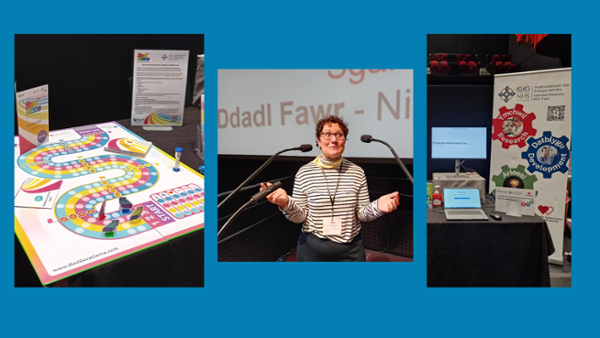
3.6 Velindre proud to be part of successful clinical trial
The results of INTERLACE trial marks the biggest cervical cancer drug advance in twenty years.
The success of the INTERLACE clinical trial is being reported recently, bringing the promise of improvement in outcomes for women diagnosed with cervical cancer.
Emma Hudson, Clinical Oncologist, and trial Principal Investigator at Velindre, is proud to have been part of this successful study which is set to become a new standard of treatment for cervical cancer.
“I’m very grateful that patients from Wales had the chance to participate in this clinical trial, and I’d like to thank those who made the very important decision to take part. Velindre Cancer Centre was one of the top recruiting centres to this trial within the UK and research cannot progress without the commitment of our patients to clinical trials.
“These results are brilliant for our patients of the future who will benefit from the new treatment,” said Dr Emma Hudson.
INTERLACE saw half the patients in the trial receive an additional course of carboplatin and paclitaxel chemotherapy once a week for six weeks, before receiving the standard combination of radiotherapy plus weekly cisplatin and brachytherapy, known as chemoradiation.
The control group received only the usual chemoradiation.
The results show that after five years:
- 73% of women in the trial group had no recurrence or spread of their cancer.
- 80% of those who received the new treatment were still alive.
This compares to the control group where 64% had not seen their cancer return or spread and 72% were alive.
Dr Iain Foulkes from Cancer Research UK who funded the UCL Cancer Institute-led trial, said:
"Timing is everything when you're treating cancer. A growing body of evidence is showing the value of additional rounds of chemotherapy before other treatments like surgery and radiotherapy in several other cancers. Not only can it reduce the chances of cancer coming back, it can be delivered quickly using drugs already available worldwide.
We're excited for the improvements this trial could bring to cervical cancer treatment and hope short courses of induction chemotherapy will be rapidly adopted in the clinic.”
Dr Mary McCormack, lead investigator of the trial from UCL Cancer Institute and UCLH, said "Our trial shows that this short course of additional chemotherapy delivered immediately before the standard CRT can reduce the risk of the cancer returning or death by 35%.
This is the biggest improvement in outcome in this disease in over 20 years."
She went on to tell the BBC’s Today programme: “The important thing here is that if patients are alive and well, without the cancer recurring at five years, then they are very likely to be cured, so that’s what makes this very exciting.”
Read more on this success story on the BBC website. [https://www.bbc.co.uk/news/health-67192441]
3.7 Ground-breaking trial to beat brain tumours begins at Velindre
A major UK clinical trial to treat the most aggressive brain tumour has opened at the Velindre Cancer Centre.
The three-year phase II trial known as ARISTOCRAT, funded by The Brain Tumour Charity, will investigate whether combining cannabinoids and chemotherapy can help extend the lives of people diagnosed with recurrent glioblastoma. It will recruit more than 230 glioblastoma patients at 14 NHS hospitals across Great Britain in 2023. Participants will self-administer nabiximols, a cannabis extract, or placebo oral spray and will undergo regular follow‑ups with the clinical trial team including blood tests and MRI scans.
"This is a really exciting trial that we're delighted to be involved in and a great opportunity for brain tumour patients to potentially improve their quality of life and survival outcomes.
Our Research Team has worked really hard to open this study here at Velindre Cancer Centre. We've recruited our first patient and I'm hoping there will be many more in the future. Survival of high-grade brain tumours is very limited despite intense and active research, so the opportunity for another treatment option will be extremely valuable to patients," said Dr Jillian Maclean, Consultant Oncologist at Velindre Cancer Centre.
In August 2021, a fundraising appeal by the Brain Tumour Charity, backed by Olympic champion Tom Daley, raised the £450,000 needed for this phase II trial in just three months.
Glioblastoma in the most aggressive form of brain cancer with an average of less than 10 months after recurrence.
In 2021, the phase I clinical trials in 27 patients found that nabiximols could be tolerated by patients in combination with chemotherapy and has the potential to extend the lives of those with recurrent glioblastoma. Should the trial prove successful experts hope that nabiximols could represent a new, promising addition to NHS treatment for glioblastoma patients since temozolomide chemotherapy in 2007.
3.8 Blogging for World Radiography Day 2023
The Centre for Trials Research (CTR) celebrated World Radiography Day 2023 by publishing a blog on 'Radiotherapy Trials and Beyond'.
Including contribution from Velindre’s Jack Pritchard, Senior Research Radiographer, the blog highlighted the expertise of the CTR in running radiotherapy trials that refine knowledge of radiotherapy treatments. The CTR also highlighted how they collaborate with the radiography profession, particularly Velindre research radiographers to set-up and deliver radiotherapy trials.
The blog can be found on Cardiff University’s website
3.9 Velindre shines in ITV programme about clinical trials
Wales this Week looked at the state of clinical trials in Wales, spotlighting our successful FAKTION trial.
The programme aired on ITV Wales on 05 March 2024 and explored the world of clinical trials in Wales, with our successful FAKTION trial shown as a positive example of the impact of research on future treatments. ITV interviewed Professor Rob Jones who explained the importance of clinical trials, talked about how the FAKTION trial has resulted in improved outcomes for patients, and how patient involvement in trials can benefit the NHS.
Our patient, Farhana Badat and her husband welcomed the film crew into their home and shared what being on the trial has meant to their family. Initially given six months to live, Farhana has been on the trial for seven years, seen four new grandchildren born and is loving life!
The programme also talked to patients who were asking for more trials to advance their treatment as well as Dr Nicola Williams, National Director of Support and Delivery at Health and Care Research Wales, who gave the big picture view of clinical trials in Wales.
Thanks to everyone who supported the filming at the cancer centre, especially the wonderful staff of the Clinical Trials Unit and the reluctant Ruth Allan for her cameo appearance.
You can watch the programme, Wales This Week : Clinical Trials: Life in the Waiting Room on ITVX.
There is also a news story about Farhana’s experience on the trial on the ITV website.
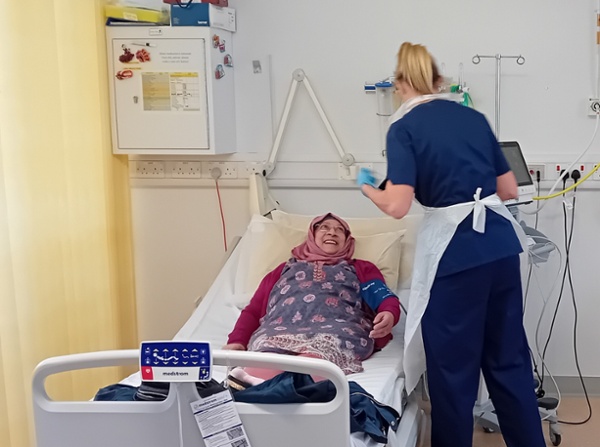 Ruth Allan, Research Nurse, in action taking Farhana's blood pressure
Ruth Allan, Research Nurse, in action taking Farhana's blood pressure
3.10 Velindre presents ongoing work
Velindre University NHS Trust was represented at the following conferences during the financial year 2023-24.
Wales Cancer Network (WCN) held its inaugural Radiotherapy Education Event in October 2023. The event brought together multi‑disciplinary teams working across radiotherapy services in Wales. Those attending were able to hear about the current state of radiotherapy in Wales, with the conference also including sessions on Stereotactic Ablative Radiotherapy (SABR), research and developments and clinical trials.
Velindre successfully had three posters accepted for the conference:
- An overview of Surface Guided Radiotherapy for Prostate Cancer at Velindre Cancer Centre: Initial findings. Steven Floyd, Senior Radiographer.
- A paperless workflow in a radiotherapy department with multiples treatment delivery vendors and treatment planning systems: Utilisation of care paths with ARIA. Gavin Soper, Senior Radiographer.
The Wales Cancer Research Centre’s 2024 conference, “Inspiring success: Building on our Strengths”, took place in March 2024. The conference provided an opportunity for cancer researchers in Wales to meet together, across specialties, institutions, and research areas. Speakers from Wales and the UK covered the latest advances in cancer research, and there were opportunities to meet colleagues to help stimulate future partnerships.
The call for conference abstracts asked for submissions to be related to one of the CReSt themes. Velindre successfully had three posters accepted for the conference:
- Successful screening, what does it look like. Amanda Jackson, Research Nurse Team Lead and Michelle Harry, Senior Research Nurse Manager.
- Early Phase Clinical Trial Patient Experience Questionnaire. Gabriella Brutto, Early Phase Research Nurse, CCRH; Katie Gilmour Early Phase Research Nurse, CCRH; Hannah Woodington, Research Nurse, Haematology Clinical Research Unit, CVUHB; and Jenni Davies Research Nurse, Haematology Clinical Research Unit, CVUHB.
- Upskilling the workforce to deliver Advanced Therapy Medicinal Products (ATMPs) to Cancer Patients across multiple sites – an Agile workforce. Claire Lang Senior Research Nurse Manager, CCRH; Gabriella Brutto, Early Phase Research Nurse CCRH; and Katie Gilmour Early Phase Research Nurse CCRH.
3.11 Research first for therapeutic radiography
Fran Lewis, Radiotherapy Planning Radiographer, is the first Trust therapeutic radiographer to have been awarded a highly competitive Research Capacity Building Collaboration (RCBC) Wales, First into Research fellowship. She will be conducting a study on “Exploratory qualitative mapping of the Kaizen culture implemented in Toyota onto a radiotherapy setting”.
Fran’s fellowship project is to see if the Trust could take the Toyota culture and implement it in Velindre Cancer Centre Radiotherapy Department. Fran is going examine the differences and similarities in the two cultures, Toyota and NHS, to see if Toyota’s Kaizen way of working could benefit the department. This will include focus groups, with staff at all levels across both organisations answering questions and sharing their ideas.
"It's a culture where people feel valued with change driven from the ground up using the Kaizen method. I was impressed by the way everyone knew what they were doing - they were busy but calm and very organised," said Fran.
Cath Matthams, Superintendent Radiographer - R&D said, "I am thrilled that Fran has been awarded this opportunity. Therapeutic radiographers are often under-represented as a professional group, particularly within the field of research. However, they are ideally placed to conceive, develop and lead research that is clinically relevant to the profession, enhances service provision and improves outcomes for patients treated with radiotherapy. Well done Fran!"
The fellowship means Fran can dedicate a day a week to the project.
RCBC Wales is funded by the Welsh Government through Health and Care Research Wales with the purpose to increase research capacity to nurses, midwives, pharmacists, allied health professionals and healthcare scientists across Wales. This is achieved through several schemes that include First into Research (FiR), PhDs and Post‑Doctoral fellowships.
The FiR fellowship is targeted at newcomers to research or those wishing to develop confidence in research, to work on projects seeking answers to questions relevant to their professional field. This is supported through funding study, on a part time basis over 12 months.
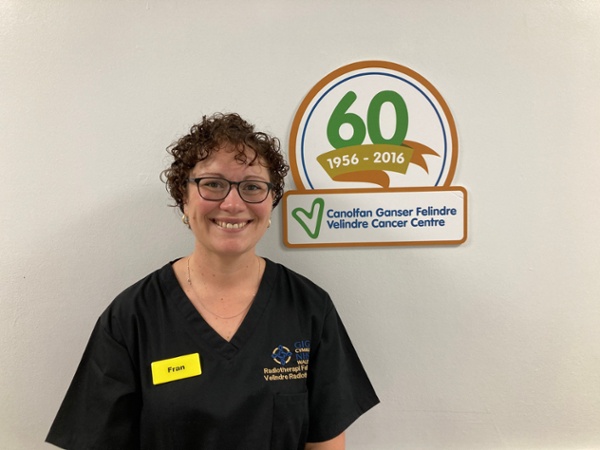 Fran Lewis, Radiotherapy Planning Radiographer
Fran Lewis, Radiotherapy Planning Radiographer
3.12 Radiotherapy researchers leading the way with first commercial device trial
A new research trial opened recently marking the first commercial medical device trial lead by the Radiotherapy Research team at Velindre Cancer Centre. The SABRE trial involves the use of the SpaceOAR Vue system designed by Boston Scientific in patients being treated with radiotherapy for prostate cancer.
Radiation therapy is extremely effective in targeting and treating prostate cancer. Side effects can be mild and go away on their own but for some patients they can last for years after treatment and can impact on quality of life.
Velindre is one of only two centres in the UK taking part in this trial which combines the use of the spacer with a five-fraction regime of radiotherapy, something the radiotherapy service has experience in.
Matthew Lazarus, Senior Research Radiographer said, "This is exciting because we don't see many commercial trials in radiography, and this is our first trial of a commercial medical device.
"Prostate cancer is very treatable, but the treatment can have lasting side effects including diarrhoea, constipation and damage to the rectal wall. The spacer is designed to reduce the long-term side effects from radiotherapy to the rectum.
"Interest in the study from our patients has been fantastic and we have recruited our first patient to the trial. They have had the spacer inserted and are currently undergoing radiotherapy planning. We have three other patients currently interested in the trial and considering it as an option.
"We have experience with spacers and have collaborated with Boston Scientific before so getting this trial is a real reflection of expertise and experience."
SpaceOAR Hydrogel temporarily creates a barrier between the prostate and the rectum, reducing the radiation dose delivered to the rectum during prostate radiation therapy. Due to the proximity, prostate radiation therapy can unintentionally cause damage to the rectum, which can lead to issues with bowel function.
Two powders are mixed with a solution which is injected as liquid through a small needle inserted between the rectum and the prostate. The liquid solidifies to the texture of a bouncy ball, but the patient cannot feel it when it is in place. By acting as a spacer, the hydrogel temporarily moves the rectum away from the prostate. As the gel is water-based it breaks down into water molecules which are passed by the body within six months of injection.
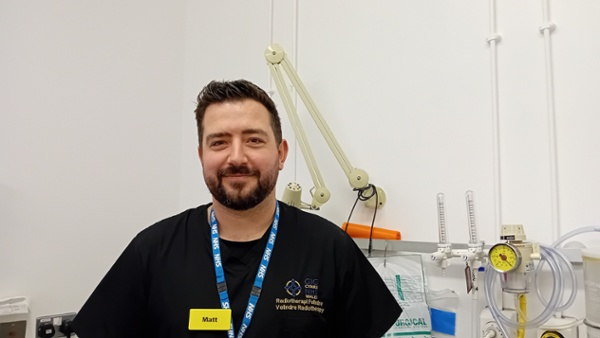 Matt Lazarus, Senior Research Radiographer
Matt Lazarus, Senior Research Radiographer
3.13 Mentoring for success in Radiotherapy Research
Cath Matthams went to London to go speed dating and came away with a great new partner – a research mentor!
Cath is the Superintendent Radiographer – R&D in the Radiotherapy Department at Velindre and when she finished her MSc in Advanced Clinical Practice Radiotherapy and Oncology, she wanted to continue to be research active. She successfully applied to the College of Radiographers’ Formal Radiography Research Mentoring (FoRRM) scheme and that’s where the speed dating came in.
"I believe I am the first radiographer in Wales to be accepted onto this mentoring scheme and the experience so far has been invaluable," said Cath.
" I want to become more connected in my research community, collaborating with others in the profession and building on my own research skills. The first thing Amy urged me to do was to be more active on social media where she signposted me to resources and a whole radiography research community.
"I am very proud to part of the therapeutic radiography profession and have a real sense of achievement getting the support of my research mentor.
"The knowledge I gain from this mentoring year will help me lead my research team as well as build my own research practice and experience. By investing in myself I am investing in my future, and the future of radiotherapy research at Velindre.”
At the FoRRM launch event in London, those accepted on the scheme were given five minutes with experienced research academics from all over the country to discuss their different areas of interest. They then picked their top three prospective mentors, and a steering group completed the matching process.
Cath was thrilled to get matched with her first choice, Dr Amy Hancock, Senior Lecturer in Medical Imaging at the University of Exeter.
“Amy is a therapeutic radiographer with expertise in qualitative research and co-production, exactly the type of research I am interested in.
“She has a similar professional background to me and is very well connected. I know I am going to learn a lot from Amy over the coming year,” said Cath.
The aim of the FoRRM scheme is to increase research capacity and quality of radiographers involved in research in the UK and to prepare the future research leaders in radiography.
Cath is part of the fourth cohort of the scheme and results have been overwhelmingly positive from each previous cohort. Her mentor Amy was a mentee in a previous cohort where she consolidated her skills and shaped her career with her mentor. Now Amy is looking forward to doing the same for Cath.
Cath and Amy have co-constructed objectives for the year and meet regularly to keep progress on track.
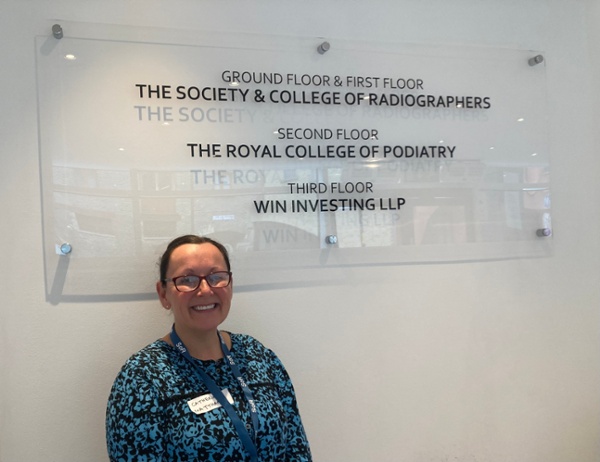 Cath Matthams at the Society and College of Radiographers
Cath Matthams at the Society and College of Radiographers
3.14 Study performance ranking and other news
3.14.1 Study performance rankings
|
Ranking |
Study Title |
Summary |
|
Top European Recruiter |
OPTIMA |
Optimal Personalised Treatment of early breast cancer using Multi-parameter Analysis |
|
Top UK Recruiter |
BNT122 01 |
A multi-site, open-label, Phase II, randomized, controlled trial to compare the efficacy of RO7198457 versus watchful waiting in resected, Stage II (high risk) and Stage III colorectal cancer patients who are ctDNA positive following resection |
|
Top UK Recruiter |
CONCORDE |
A platform study of DNA damage response inhibitors in combination with conventional radiotherapy in non-small cell lung cancer |
|
Top UK Recruiter |
MK-1308A-008 |
A Phase 2, Multicenter, Multi Arm, Study to Evaluate Pembrolizumab (MK-3475) or MK-1308A (Co-formulated quavonlimab (MK-1308)/pembrolizumab) in Participants with Microsatellite Instability-High (MSI-H) or Mismatch Repair Deficient (dMMR) Stage IV Colorectal Cancer |
|
Top UK Recruiter |
Ariel |
A biomarker enrichment trial of anti-EGFR agents in patients with advanced colorectal cancer (aCRC) with wild-type RAS and right primary tumour location (right-PTL) |
|
Top UK Recruiter |
RAPPER |
Radiogenomics: Assessment of Polymorphisms for Predicting the effects of Radiotherapy |
|
Top UK Recruiter |
I-Prehab |
Inclusive prehab (I-Prehab) to address inequity in cancer outcomes: mixed-methods evaluation research |
|
Top UK Recruiter |
CA209-76K
|
A Phase 3, Randomized, Double-Blind Study of Adjuvant Immunotherapy with Nivolumab versus Placebo after Complete Resection of Stage IIB/C Melanoma |
|
Top UK Recruiter |
Hidden 2 |
Hospital Deep Vein Thrombosis Detection Study in Cancer Patients Receiving Palliative Care |
|
Top UK Recruiter |
PEARL |
PET based adaptive radiotherapy in locally advanced HPV positive oropharyngeal cancer |
|
Top UK Recruiter |
PACIFIC 8 |
A Phase III, Randomised, Double-blind, Placebo-controlled, Multicentre, International Study of Durvalumab plus Domvanalimab (AB154) in Participants with Locally Advanced (Stage III), Unresectable Non-small Cell Lung Cancer Whose Disease has not Progressed Following Definitive Platinum-based Concurrent Chemoradiation Therapy |
|
Top UK Recruiter |
INTRINSIC |
Priming the Tumour MicroEnvironment for Effective Treatment with Immunotherapy in Locally Advanced Rectal Cancer A Phase II trial of Durvalumab (MEDI 4736) in Combination with Extended Neoadjuvant Regimens in Rectal Cancer |
|
Top UK Recruiter |
SERENITY |
Barriers and facilitators to deprescribing antithrombotic therapy in advanced cancer patients: A qualitative interview study of patients’, companions’ and clinicians’ experiences and perspectives |
|
Top UK Recruiter |
ARISTOCRAT |
A randomised controlled phase II trial of temozolomide with or without cannabinoids in patients with recurrent glioblastoma |
|
2nd Highest UK Recruiter |
PARTNER |
Randomised, phase II/III, 3 stage trial to evaluate the safety and efficacy of the addition of olaparib to platinum-based neoadjuvant chemotherapy in breast cancer patients with TNBC and/or gBRCA. |
|
2nd Highest UK Recruiter |
Genmab GCT1015-05 |
A Phase 1b/2 Open-Label Trial of Tisotumab Vedotin (HuMax®-TF-ADC_ in combination with Other Agents in Subjects with Recurrent or Stage IVB Cervical Cancer |
|
2nd Highest UK Recruiter |
SCOPE 2 |
A randomised Phase II/III trial to study radiotherapy dose escalation in patients with oesophageal cancer treated with definitive chemo-radiation with an embedded Phase II trial for patients with a poor early response using positron emission tomography (PET) |
|
2nd Highest UK Recruiter |
CORINTH |
PHASE 1B/II TRIAL OF CHECKPOINT INHIBITOR (PEMBROLIZUMAB AN ANTI PD-1 ANTIBODY) PLUS STANDARD IMRT IN HPV INDUCED STAGE III SQUAMOUS CELL CARCINOMA (SCC) OF ANUS |
|
2nd Highest UK Recruiter |
TROPION 02 |
A Phase 3, Open-label, Randomised Study of Datopotamab Deruxtecan (Dato-DXd) Versus Investigator’s Choice of Chemotherapy in Patients who are not Candidates for PD-1/PD-L1 Inhibitor Therapy in First-line Locally Recurrent Inoperable or Metastatic Triple-negative Breast Cancer |
|
2nd Highest UK Recruiter |
Phoenix |
A pre-surgical window of opportunity and post-surgical adjuvant biomarker study of DNA damage response inhibition and/or anti-PD-L1 immunotherapy in patients with neoadjuvant chemotherapy resistant residual triple negative breast cancer Version: 1.0 |
|
Joint 2nd Highest UK Recruiter |
SCANCELL (The Scope Study) |
A Phase 2, Multicenter, Open-Label Study of SCIB1 in Patients with Advanced Unresectable Melanoma Receiving Pembrolizumab |
|
Joint 2nd Highest UK Recruiter |
Cypides |
Safety and pharmacokinetics of ODM-208 in patients with metastatic castration-resistant prostate cancer |
|
3rd Highest UK Recruiter |
PLATFORM |
Planning treatment for oesophago-gastric cancer: a randomised maintenance therapy trial |
|
3rd Highest UK Recruiter |
LIBRETTO-531 |
A Multicenter, Randomized, Open-label, Phase 3 Trial Comparing Selpercatinib to Physicians Choice of Cabozantinib or Vandetanib in Patients with Progressive, Advanced, Kinase Inhibitor Naïve, RET-Mutant Medullary Thyroid Cancer |
|
2nd Highest UK Recruiter |
TROPION 03 |
A Phase 3 Open-label, Randomised Study of Datopotamab Deruxtecan (Dato-DXd) With or Without Durvalumab Versus Investigator’s Choice of Therapy in Patients With Stage I-III Triple-negative Breast Cancer Who Have Residual Invasive Disease in the Breast and/or Axillary Lymph Nodes at Surgical Resection Following Neoadjuvant Systemic Therapy |
|
3rd Highest UK Recruiter |
TRITON 3 |
A Multicenter, Randomized, Open-label Phase 3 Study of Rucaparib versus Physician’s Choice of Therapy for Patients with Metastatic Castration-resistant Prostate Cancer Associated with Homologous Recombination Deficiency |
|
3rd Highest UK Recruiter |
VALTIVE1 |
A non-randomised, observational, biomarker study to determine the clinical value of measuring plasma Tie2 concentrations in patients with ovarian cancer who are receiving bevacizumab |
|
3rd Highest UK Recruiter |
Aurora |
Atezolizumab in patients with urinary tract squamous cell carcinoma: a single arm, open label, multicentre, phase II clinical trial |
|
3rd Highest UK Recruiter |
Cardiac Care |
A multicentre prospective randomised open-label blinded end-point controlled trial of high-sensitivity cardiac troponin I-guided combination angiotensin receptor blockade and beta blocker therapy to prevent cardiac toxicity in breast cancer patients receiving anthracycline adjuvant therapy. |
|
4th Highest UK Recruiter |
PARADIGM 2 |
OlaPArib and RADIotherapy or olaparib and radiotherapy plus temozolomide in newly diagnosed Glioblastoma stratified by MGMT status: 2 parallel phase I studies |
|
4th Highest UK Recruiter |
InPACT |
International Penile Advanced Cancer Trial |
|
4th Highest UK Recruiter |
SPECTA |
Screening Cancer Patients for Efficient Clinical Trial Access |
|
4th Highest UK Recruiter |
Glioblastoma |
Improving treatment of glioblastoma, 1.0 |
|
Joint 4th Highest UK Recruiter |
NET-02 |
A non-interventional, multicenter, multiple cohort study investigating the outcomes and safety of atezolizumab under real-world conditions in patients treated in routine clinical practice |
|
Joint 4th Highest UK Recruiter |
AVANZAR |
A Phase III, Randomised, Open-label, Multicentre, Global Study of Datopotamab Deruxtecan (Dato-DXd) in Combination With Durvalumab and Carboplatin Versus Pembrolizumab in Combination With Platinum-based Chemotherapy for the First-line Treatment of Patients With Locally Advanced or Metastatic NSCLC Without Actionable Genomic Alterations |
|
Joint 4th Highest UK Recruiter |
BO42864 (A.K.A BLU-667-2303 & AcceleRET Lung) |
A Randomized, Open-Label, Phase 3 Study of Pralsetinib versus Standard of Care for First Line Treatment of RET fusion-positive, Metastatic Non-Small Cell Lung Cancer |
|
5th Highest UK Recruiter |
E²-RADIatE |
OligoCare: A pragmatic observational cohort study to evaluate radical radiotherapy for oligo-metastatic cancer patients |
|
Joint 5th Highest UK Recruiter |
CAPItello-281 |
A Phase III Double-Blind, Randomised, Placebo-Controlled Study Assessing the Efficacy and Safety of Capivasertib + Abiraterone Versus Placebo + Abiraterone as Treatment for Patients with De Novo Metastatic Hormone-Sensitive Prostate Cancer (mHSPC) Characterised by PTEN deficiency |
3.14.2 Other news
|
PICCOS |
|
|
Study Title: |
Pressurised IntraPeritoneal Aerosolised Chemotherapy (PIPAC) in the management of cancers of the colon, ovary and stomach: a randomised controlled phase II trial of efficacy in peritoneal metastases. |
|
News: |
Velindre was the first site to open the trial in the UK and also the first site to recruit a participant. |
|
TROPION 05 |
|
|
Study Title: |
A Phase III, Open-label, Randomised Study of Datopotamab Deruxtecan (Dato-DXd) in Combination with Durvalumab Compared with Investigator’s Choice of Chemotherapy (Paclitaxel, Nab Paclitaxel or Gemcitabine + Carboplatin) in Combination with Pembrolizumab in Patients with PD L1 Positive Locally Recurrent Inoperable or Metastatic Triple Negative Breast Cancer. |
|
News: |
Velindre is the third global site to open the trial. |
|
FOxTROT4 |
|
|
Study Title: |
A phase III randomized trial evaluating neoadjuvant chemotherapy in older and/or frail patients with locally advanced but operable colon cancer. |
|
News: |
Velindre is the second national site to open the trial and recruit a participant. |
|
ONCOVID |
|
|
Study Title: |
Natural history and outcomes of cancer patients during the COVID19 epidemic. |
|
News: |
The NIH collaboration paper has been accepted for publication on the International Journal of Infectious Disease. |
|
LIBRETTO 531 |
|
|
Study Title: |
A Multicenter, Randomized, Open-label, Phase 3 Trial Comparing Selpercatinib to Physicians Choice of Cabozantinib or Vandetanib in Patients with Progressive, Advanced, Kinase Inhibitor Naïve, RET-Mutant Medullary Thyroid Cancer. |
|
News: |
The results of the LIBRETTO-531 preplanned efficacy interim analysis, entitled “Randomized Phase 3 Study of Selpercatinib versus Cabozantinib or Vandetanib” in Advanced, Kinase Inhibitor-Naïve, RET-mutant Medullary Thyroid Cancer, were presented during the Presidential Podium Session on the 21st of October 2023 at the 2023 ESMO meeting: ESMO Congress 2023 | OncologyPRO.
The primary manuscript was simultaneously published in the New England Journal of Medicine. |
|
CompARE |
|
|
Study Title: |
TROPION 02 - A Phase 3, Open-label, Randomised Study of Datopotamab Deruxtecan (Dato-DXd) Versus Investigator’s Choice of Chemotherapy in Patients who are not Candidates for PD-1/PD-L1 Inhibitor Therapy in First-line Locally Recurrent Inoperable or Metastatic Triple-negative Breast Cancer. |
|
News: |
Velindre are currently the second-best UK recruiting site. There are currently 12 sites open across the UK. |